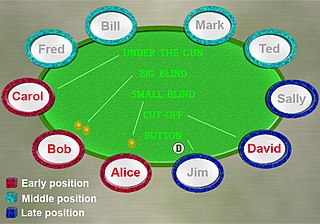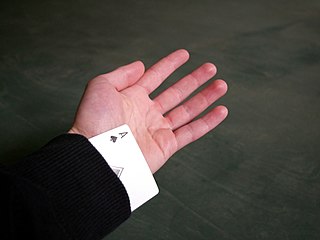
Blackjack is the American variant of a globally popular banking game known as Twenty-One, whose relatives include Pontoon and Vingt-et-Un. It is a comparing card game between usually several players and a dealer, where each player in turn competes against the dealer, but players do not play against each other. It is played with one or more decks of 52 cards, and is the most widely played casino banking game in the world. The objective of the game is to beat the dealer in one of the following ways:

Poker is a family of card games that combines gambling, strategy, and skill. All poker variants involve betting as an intrinsic part of play, and determine the winner of each hand according to the combinations of players' cards, at least some of which remain hidden until the end of the hand. Poker games vary in the number of cards dealt, the number of shared or "community" cards, the number of cards that remain hidden, and the betting procedures.
A check-raise in poker is a common deceptive play in which a player checks early in a betting round, hoping someone else will open. The player who checked then raises in the same round.

In the card game of poker, a bluff is a bet or raise made with a hand which is not thought to be the best hand. To bluff is to make such a bet. The objective of a bluff is to induce a fold by at least one opponent who holds a better hand. The size and frequency of a bluff determines its profitability to the bluffer. By extension, the phrase "calling somebody's bluff" is often used outside the context of poker to describe cases where one person "demand[s] that someone prove a claim" or prove that he or she "is not being deceptive."

In the game of poker, the play largely centers on the act of betting, and as such, a protocol has been developed to speed up play, lessen confusion, and increase security while playing. Different games are played using different types of bets, and small variations in etiquette exist between cardrooms, but for the most part the following rules and protocol are observed by the majority of poker players.
Seven-card stud, also known as Seven-Toed Pete or Down-The-River is a variant of stud poker. Until the recent increase in popularity of Texas hold 'em, seven-card stud was the most widely played poker variant in home games across the United States, and in casinos in the eastern part of the country. Two to eight players is common, though eight may require special rules for the last cards dealt if no players fold. With experienced players who fold often, even playing with nine players is possible.

Texas hold 'em is a variation of the card game of poker. Two cards, known as hole cards, are dealt face down to each player, and then five community cards are dealt face up in three stages. The stages consist of a series of three cards, later an additional single card, and a final card. Each player seeks the best five card poker hand from any combination of the seven cards of the five community cards and their two hole cards. Players have betting options to check, call, raise, or fold. Rounds of betting take place before the flop is dealt and after each subsequent deal. The player who has the best hand and has not folded by the end of all betting rounds wins all of the money bet for the hand, known as the pot.

Cheating in poker is any behavior outside the rules that is intended to give an unfair advantage to one or more players.

Euchre or eucre is a trick-taking card game most commonly played with four people in two partnerships with a deck of 24, 28, or sometimes 32, standard playing cards. It is the game responsible for introducing the joker into modern packs; this was invented around 1860 to act as a top trump or best Bower. It is believed to be closely related to the French game Écarté that was popularized in the United States by the Cornish and Pennsylvania Dutch, and to the seventeenth-century game of bad repute Loo. It may be sometimes referred to as Knock Euchre to distinguish it from Bid Euchre.

Faro, Pharaoh, Pharao, or Farobank is a late 17th-century French gambling card game. It is descended from Basset, and belongs to the Lansquenet and Monte Bank family of games due to the use of a banker and several players. Winning or losing occurs when cards turned up by the banker match those already exposed.

Card counting is a casino card game strategy used primarily in the blackjack family of casino games to determine whether the next hand is likely to give a probable advantage to the player or to the dealer. Card counters are a class of advantage players, who attempt to decrease the inherent casino house edge by keeping a running tally of all high and low valued cards seen by the player. Card counting allows players to bet more with less risk when the count gives an advantage as well as minimize losses during an unfavorable count. Card counting also provides the ability to alter playing decisions based on the composition of remaining cards.

Play Your Cards Right is a British television game show based on, and played similarly to, the American show known as Card Sharks.
Razz is a form of stud poker that is normally played for ace-to-five low. It is one of the oldest forms of poker, and has been played since the very start of the 20th Century. It emerged around the time people started using the 52-card deck instead of 20 for poker.
These novelty forms of archery are generally regarded as amusements, and, as such, are not governed by organizationally-sanctioned rules.
The mathematics of gambling are a collection of probability applications encountered in games of chance and can be included in game theory. From a mathematical point of view, the games of chance are experiments generating various types of aleatory events, the probability of which can be calculated by using the properties of probability on a finite space of events.
The following is a glossary of poker terms used in the card game of poker. It supplements the glossary of card game terms. Besides the terms listed here, there are thousands of common and uncommon poker slang terms. This is not intended to be a formal dictionary; precise usage details and multiple closely related senses are omitted here in favor of concise treatment of the basics.
Stud poker is any of a number of poker variants in which each player receives a mix of face-down and face-up cards dealt in multiple betting rounds. Stud games are also typically non-positional games, meaning that the player who bets first on each round may change from round to round. The cards dealt face down to each individual player are called hole cards, which gave rise to the common English expression ace in the hole for any hidden advantage.
Poker is a popular card game that combines elements of chance and strategy. There are various styles of poker, all of which share an objective of presenting the least probable or highest-scoring hand. A poker hand is usually a configuration of five cards depending on the variant, either held entirely by a player or drawn partly from a number of shared, community cards. Players bet on their hands in a number of rounds as cards are drawn, employing various mathematical and intuitive strategies in an attempt to better opponents.
Draw poker is any poker variant in which each player is dealt a complete hand before the first betting round, and then develops the hand for later rounds by replacing, or "drawing", cards.










